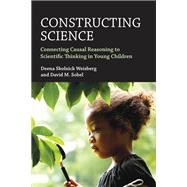
Constructing Science Connecting Causal Reasoning to Scientific Thinking in Young Children
by Weisberg, Deena Skolnick; Sobel, David M.Buy New
Rent Textbook
Used Textbook
We're Sorry
Sold Out
eTextbook
We're Sorry
Not Available
How Marketplace Works:
- This item is offered by an independent seller and not shipped from our warehouse
- Item details like edition and cover design may differ from our description; see seller's comments before ordering.
- Sellers much confirm and ship within two business days; otherwise, the order will be cancelled and refunded.
- Marketplace purchases cannot be returned to eCampus.com. Contact the seller directly for inquiries; if no response within two days, contact customer service.
- Additional shipping costs apply to Marketplace purchases. Review shipping costs at checkout.
Summary
Young children have remarkable capacities for causal reasoning, which are part of the foundation of their scientific thinking abilities. In Constructing Science, Deena Weisberg and David Sobel trace the ways that young children’s sophisticated causal reasoning abilities combine with other cognitive, metacognitive, and social factors to develop into a more mature set of scientific thinking abilities. Conceptualizing scientific thinking as the suite of skills that allows people to generate hypotheses, solve problems, and explain aspects of the world, Weisberg and Sobel argue that understanding how this capacity develops can offer insights into how we can become a more scientifically literate society.
Investigating the development of causal reasoning and how it sets the stage for scientific thinking in the elementary school years and beyond, Weisberg and Sobel outline a framework for understanding how children represent and learn causal knowledge and identify key variables that differ between causal reasoning and scientific thinking. They present empirical studies suggesting ways to bridge the gap between causal reasoning and scientific thinking, focusing on two factors: contextualization and metacognitive thinking abilities. Finally, they examine children’s explicit understanding of such concepts as science, learning, play, and teaching.
Author Biography
Table of Contents
I The Foundations of Scientific Thinking
1 How Do We Develop the Capacity to Think Scientifically? 3
2 The Evolution of Rational Constructivism 21
3 Beyond Rational Constructivism 61
II Bridging Causal Reasoning to Scientific Thinking
5 A New Blicket Detector Task 125
6 Contextualization in Causal Reasoning and Scientific Thinking 135
7 Causal Reasoning and the Development of Metacognitive Thinking: Cross-Sectional and Longitudinal Investigations 153
III Children's Explicit Definitions of Abstract Concepts
8 Children's Definitions of "Science" 177
9 Children's Definitions of "Learning" and "Teaching" 219
10 Children's Definitions of "Pretending" 239
IV Conclusion
11 What Does It Mean to Engage in Scientific Thinking? 271
Notes 289
References 307
Index 359
An electronic version of this book is available through VitalSource.
This book is viewable on PC, Mac, iPhone, iPad, iPod Touch, and most smartphones.
By purchasing, you will be able to view this book online, as well as download it, for the chosen number of days.
Digital License
You are licensing a digital product for a set duration. Durations are set forth in the product description, with "Lifetime" typically meaning five (5) years of online access and permanent download to a supported device. All licenses are non-transferable.
More details can be found here.
A downloadable version of this book is available through the eCampus Reader or compatible Adobe readers.
Applications are available on iOS, Android, PC, Mac, and Windows Mobile platforms.
Please view the compatibility matrix prior to purchase.
